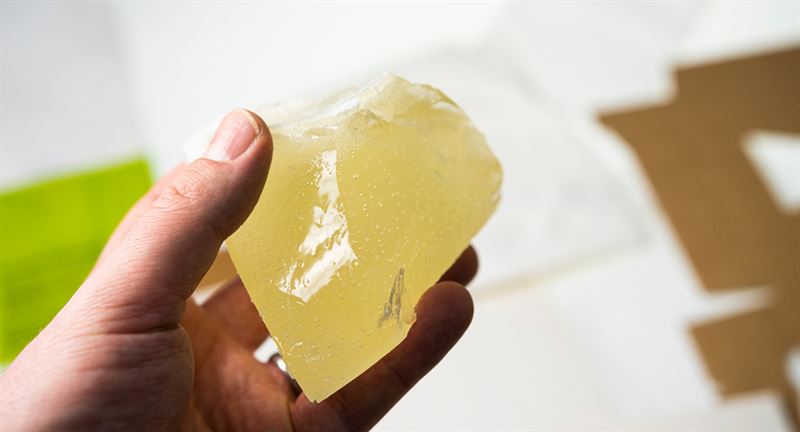Environmentally friendly Kiilto Biomelt has attracted plenty of attention. This biodegradable hot melt adhesive is suitable for, for example, takeaway food packaging and hygiene industry products, such as lamination for various non-woven fabrics.
When Kiilto launched the biodegradable hot melt adhesive Kiilto Biomelt, developed from biobased materials, word about this revolutionary product spread quickly.
”We’ve had contacts from all of the Nordic countries, Great Britain, Southern Europe, Russia, India, China, Thailand, Malaysia, Australia, New Zealand and the United States to name a few,” lists Kiilto’s Customer Service Manager, Lauri Mäkinen, with a smile.
He says that there was a gap in the market for a product like Kiilto Biomelt:
“Kiilto wants to focus on corporate responsibility and environmental choices. Judging by the feedback, it seems that our customers share this aim.”

Biodegradability a strength
Kiilto’s RDI Manager, Maija Kulla-Pelonen, explains that Kiilto Biomelt is a lactic-acid-based, hot-melt adhesive made of biodegradable raw materials.
“Plants give us starch, starch gives us sugar, sugar gives us lactic acids, and lactic acids are used to polymerise the glue,” she explains.
Kiilto Biomelt’s number one property is that it’s biodegradable.
“Biomelt composts in industrial conditions, in line with ISO standards, at a certain temperature and humidity.”
The innovation is perfectly in line with Kiilto’s Promise to the Environment. One of Kiilto’s promises is to double its use of renewable raw materials by 2022.
Ideal for takeaway goods
Biodegradable hot melt adhesive is ideal for various takeaway packaging, such as the paper bags into which food is packaged at small points of sale.
“With takeaway products, there is always the risk that the packaging will be discarded in the natural environment. On the other hand, packaging like this often has traces of fat or food, making it more difficult to recycle. This makes composting a good alternative,” says Kulla-Pelonen.
“A biodegradable hot melt adhesive can be a good choice for packaging in markets where no proper recycling exists,” says Mäkinen.
Several applications
Kiilto Biomelt has many applications in hygiene products, for example.
”Compostable hygiene products are already on the market, but none of them use a biodegradable hot melt adhesive yet. Biodegradable glue would make the entire product compostable,” says Kulla-Pelonen.
Kiilto Biomelt has also been tested for additional properties, such as better printability and heat-sealability. In addition, it has been tested on laminate structures, to improve adhesiveness between the structures.
“In future, we will try to develop an application for the needs of the tape and sticker industry.”
Actual, ongoing projects
Lauri Mäkinen says that interest in Kiilto Biomelt has already led to actual projects.
“The biggest current project concerns hygiene products, but for reasons of confidentiality I cannot say more.”
“Biomelt is currently under pilot production only. The time has now come to consider whether we will invest in equipment enabling larger-scale production,” says Mäkinen.
